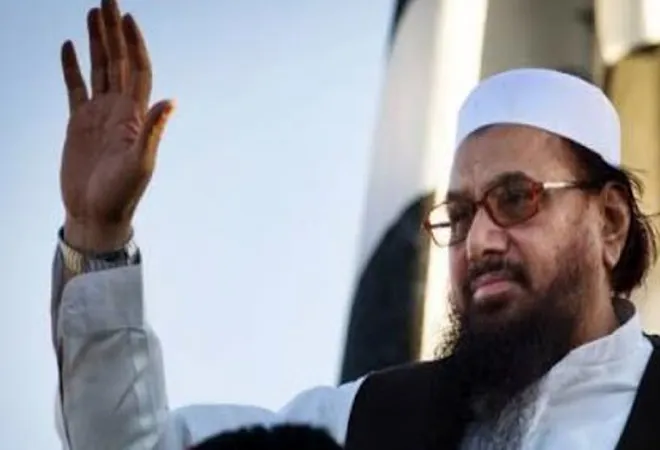
On February 12 this year, the then President Mamnoon Hussain issued an ordinance to amend the Anti-Terrorism Act 1997, which sanctioned a nationwide ban against groups and individuals enlisted as terrorists by the United Nations. These include Hafiz Saeed, who has been the UN’s “specially designated terrorist” for the past decade, and his affiliated groups.
The ordinance was passed days before the Financial Action Task Force (FATF) meeting in Paris, where Pakistan feared being moved to the grey-list for insufficient action against terror groups. This was a move reminiscent of Pakistan putting Hafiz Saeed under house arrest ahead of an FATF meeting in January last year.
To get support in what was being predicted as a US led manoeuvre to put Pakistan on the terror watch-list, Islamabad made overtures to Russia and Saudi Arabia before the FATF meet in February as well. However, following what proved to be a diplomatic farce in Paris, as the then Foreign Minister Khawaja Asif irked the US officials owing to a self-congratulatory tweet that leaked details of the meeting, the American delegate was forced to call in an unprecedented second round of voting on Pakistan.
Pakistan was formally grey-listed at the FATF plenary meeting in June, with potential blacklisting looming in case Islamabad didn’t abide by the instructions released by the counterterror watchdog.
Islamabad’s case in the June meeting was put forth by the caretaker setup which had taken over from the Pakistan Muslim League-Nawaz (PML-N) led government in the lead up to the July 25 elections. When a delegation from the Financial Action Taskforce’s Asia Pacific Group (FATF-APG) visited Pakistan to monitor the progress, they too met with the caretaker officials since the Pakistan Tehrik-e-Insaf (PTI) government’s cabinet hadn’t taken oath at the time.
In August, Islamabad submitted 11 proposals in discussions with the watchdog, and underlined the actions already undertaken in a bid to avoid being blacklisted, as it aspired to get its name removed from the grey-list as well. The FATF-APG delegation was told that Islamabad is working on enhancing coordination between agencies that are monitoring money laundering –those working in Pakistan and overseas – and will increase the reporting and enforcement of counterterror actions.
During another FATF-APG team’s visit to Pakistan it was formally conveyed that the watchdog isn’t pleased with the procedures in place to scrutinise the potential terror activities and funding for such groups. Islamabad was also told that the despite legal framework being in place there is a lack of connectivity between agencies that are tasked with tracing the financial flows to suspected terror groups.
Most damningly, what has been a common theme throughout the FATF meetings is the status of Hafiz Saeed. Before the February meeting, Hafiz Saeed had publically announced that he would be contesting the July elections, just before he was designated as a terrorist in the country.
That, however, did not stop his affiliates from participating in the elections, as the Allaho Akbar Tehreek (AAT) contested in the July polls, with Hafiz Saeed established as the group’s ideologue and his face ubiquitous in campaign banners. AAT had evolved from the Milli Muslim League (MML), whose members had contested the by-elections leading up to the July elections as independent candidates after the Election Commission of Pakistan had turned down the MML’s request for an election symbol following the interior ministry’s request.
Even so, AAT’s participation in the election was questioned by the FATF-APG teams in August and last week, with Islamabad failing to come up with a convincing reply. This is because Hafiz Saeed’s indirect participation in the elections was mandated by the all-powerful military, which designed a mainstreaming process for the jihadist groups that it has used as strategic assets to target Afghanistan and India and serve its regional interests.
It is this mainstreaming process, which has brought up the likes of Tehrik-e-Labbaik Pakistan (TLP), a radical Islamist group which took credit for the removal of Atif Mian from the PM’s Economic Advisory Body last month owing to his Ahmadiyya Muslim identity, and the cancellation of the Prophet Muhammad cartoon contest in the Netherlands owing to death threats to the organisers.
The Islamist groups as a unit bagged five million votes in the July polls, which was around 10 percent of the total votes cast – twice as much as 2013. Multiple surveys have revealed that the biggest dent that these Islamist parties gave was to the PML-N vote bank, which resulted in the party being overtaken by the PTI in the July polls.
With those polls under the cloud of Army orchestrated rigging themselves, it is evident that Hafiz Saeed has the backing of the military, while the civilian leadership having to defend the policies in front of global watchdogs. But as Pakistan’s FATF grey-listing continues to hinge around Hafiz Saeed’s future, something would have to give.
The views expressed above belong to the author(s). ORF research and analyses now available on Telegram! Click here to access our curated content — blogs, longforms and interviews.




 PREV
PREV


